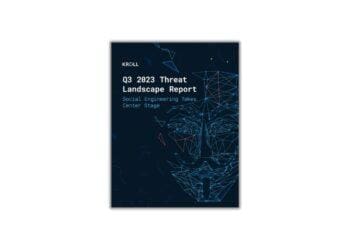(April 28, 2020) – The International Compliance Association (ICA), the leading professional body for the global regulatory and financial crime compliance community, has partnered with the International Cyber Threat Task Force (ICTTF) to offer a new program in cyber risk management.
The global cost of cyber crime is projected to double from 2015 figures, reaching $6 trillion annually by 2021[1] and worldwide spending on cybersecurity is estimated to hit $133.7 billion in 2022[2]. The worldwide coronavirus outbreak has exacerbated the threat as organizations are faced with the challenge of keeping as many business-critical functions running as possible, while maintaining adequate security. Business leaders are increasingly recognizing the threat, with 68 percent saying their cybersecurity risks are increasing.
The new 8-week online program from the ICTTF, which is suitable for managers in either the first or second line of defense[3], covers a range of topics from identification of cyber risks through to risk management options. The course has been designed to equip professionals with the knowledge, skills and confidence they need in order to protect the digital assets of their organisation and support the efforts of or lead the implementation of a cyber risk framework. Professionals can now enroll in the “Certified Cyber Risk Officer” course, which commences on June 4, 2020.
Established in 2010, the ICTTF is a not-for-profit initiative promoting the ecosystem of an international, independent, nonpartisan cybersecurity community and is committed to fostering collaboration, networking and knowledge sharing under the mantra “it takes a network to defeat a network.”
Bill Howarth, ICA President, commented: “We know that our members are contending with many new challenges right now and managing the increasing risk of cyber crime while so many employees are working from home is one of these challenges. We’re delighted to be working with the ICTTF to offer this highly practical online course that will equip compliance professionals with the tools and skills they need to work collaboratively with other parts of the business to manage cyber risk more effectively.”
Paul C Dwyer, President of ICTTF, added, “The answer to the cyber challenge is leadership and business leaders need to be informed. Measuring and managing cyber risk is now an intrinsic part of most people’s roles and not just the responsibility of a cybersecurity function. Cyber risks are holistic, and the organizations that empower their people to identify and manage risks across the business gain competitive advantage through embracing innovation. I’m really pleased to be working with ICA to offer this new program that will promote change.”
More information about the course can be viewed here.
About ICTTF
The ICTTF was established in 2010 as a not for profit initiative promoting the ecosystem of an international independent non-partisan cyber security community. Over that decade, they have consistently innovated on how best to achieve their mission. From online community portals, apps, local membership chapters and international events they strive to work with their thousands of members from around the world.
About the International Compliance Association
The International Compliance Association (ICA) is the leading professional body for the global regulatory and financial crime compliance community. It has enhanced the knowledge, skills and behaviour of over 142,000 professionals in 153 countries either through their internationally recognised portfolio of professional qualifications (awarded in association with Alliance Manchester Business School, the University of Manchester) or through accredited in-company training.
For more information visit: www.int-comp.org
[1] Source: Cybersecurity Ventures, ‘Cybercrime Will Cost the World US$6 Trillion by the End of the Year: Study’, Last accessed 27/04/2020
[2] Gartner, Global Cybercrime Damages Predicted To Reach $6 Trillion Annually By 2021, Last accessed 27/04/2020
[3] Note to editors: First line of defence refers to functions that own and manage risk. Second line of defence refers to functions that oversee or specialise in risk management, compliance.












